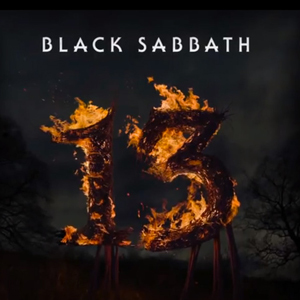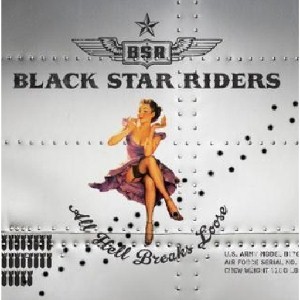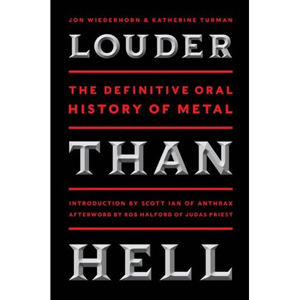The solar rocks have aligned to revisit the gravity of proto-metal.
Black Sabbath, "13" (Republic)
Both for what it is and what it's not, Black Sabbath's hard-thumping new "13" can make you ponder the rare qualities that contribute to a successful band. Not an Artist, a band.
What "13" is: The members of Black Sabbath, reunited to execute mythic producer Rick Rubin's vision of tapping the dark energy behind the group's world-shocking 1970 debut album, "Black Sabbath."
What "13" isn't: The whole band, since crucial drummer Bill Ward dropped out of the project, citing professional and monetary disrespect. It's also not the same band because the other original members -- guitarist Tony Iommi, bassist Geezer Butler and singer Ozzy Osbourne -- aren't the same desperados 43 years after the fact; the culture has changed, and so have they.
Such realities make Rubin's recapture-the-magic concept feel fakey. What the hell, though -- it mostly works. Iommi never needs urging to craft a raft of evil riffs, and he was even game enough to turn many early Sab fabrics inside-out, literally stealing from himself. Primary lyricist Butler must have viewed this as an opportunity to write between the lines of his old notebooks, revisiting everblack themes of alienation, dystopia and moral decay. And by all accounts, Osbourne, taking a holiday from what the words of "Pariah" call his addiction to sobriety, pitched in with unreserved gusto.
So -- what a gas to hear these three, supported by the far simpler but rock-hard drums of Rage Against the Machine / Audioslave drummer Brad Wilk, stretching out and grooving with such brotherly ease. Just as of yore, it will take you months to assimilate the twists and changes of the faery hops, raging landslides and melodramatic arpeggios, familiar though they will instantly resonate. The vocal hooks that stick deepest on first listenings bristle out of "Is God Dead?" and "Live Forever," but favorites will change weekly, and even the bonus tracks don't slack, relegated to a second disc maybe only because they don't quite squeeze into the flow of the main eight.
Love Iommi's solos. Being treated for cancer in the midst of the sessions, he sounds as if he's reveling in every measure, firing off spontaneous bursts of seasoned inspiration and mining a wide range of tones, from switchblade sharpness to the spooky howl that inspired him on Cream's 1967 "Disraeli Gears."
Osbourne's voice sounds as tormented as ever. He has justly complained about being straitjacketed by Iommi's riff style, and sure, he's still forced to recycle his old melodies a lot. But he now reminds me of something Doug Pinnick of King's X once told me: that Ozzy in Sabbath was something of a blues singer. The literal connection may not pop out at you, since Sab got famous for distorted post-Kinks white riffery and industrial reimaginations of British folk music. But Sabbath was born as a jazzy blues band, with all the self-imposed limits that implies. (Nobody complains that Robert Johnson repeated himself.)
"Produced by Rick Rubin" -- that phrase calls up a powerful aesthetic, but not one especially attuned to the tradition of seminal Sabbath. His focused punch with the Cult, Danzig and Slayer, for instance, shows he's not a murk dude; he likes to record lean & hard, and let your crappy stereo equipment provide the atmosphere. Except for the breakthrough "Paranoid" and "Master of Reality" albums (late 1970 and mid-1971), Sabbath have rarely rolled cleanward, certainly not on the reverb-soaked debut after which "13" is modeled. So here you get a jammy, borderline psychedelic template, recorded with a slightly later-period metallic crunch. The lack of sonic mystery, doubled by the absence of Ward's omnidirectional blunderbuss jazz drumming, takes getting used to, but the aural philosophy does let us scope out every nuance of Iommi's masterful finger shading and Ozzy's unmatchable throatwork.
Amid all its deliberate throwbacks, "13" does end up exuding a distinctive perspiration, and I'm stoked about the thing. I'll play it more than the somewhat underrealized "The Devil You Know," the 2009 album Iommi and Butler recorded with Ronnie James Dio as Heaven & Hell. But I'm still glad for the backup of "Fused," Iommi's heavyweight 2005 album with Glenn Hughes, and grateful I can spin the few songs Iommi recorded with Ian Gillan for the 2011-2012 WhoCares project. Whatever they do, Tony Iommi and Ozzy Osbourne are two auto-buys.
This is Black Sabbath, though, and with all members busy, aging and not always healthy, probably the last Black Sabbath -- it's no accident that the funereal church bells ringing at the start of "Black Sabbath" now toll at the end of "13." Hold it close to your black heart.
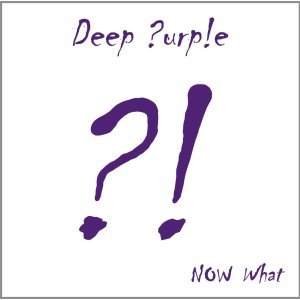
Deep Purple, "Now What?!" (Eagle)
In the Post-Blackmore Era (since 1994), Deep Purple have birthed five studio albums with Steve Morse on guitar, each claiming moments of sparkle. But only this here one makes me wanna blare it until the neighbors throw bricks.
Two factors contribute mightily. One: Founding Purple keyboardist Jon Lord died last year, giving the remaining sojourners extra motivation to mean it. Two: Bob Ezrin produced. Ezrin's hands on a bunch of early-'70s Alice Cooper albums alone would have earned him immortality -- he virtually created that great band's signature sound -- but if you throw in credits like Kiss' "Destroyer" and Pink Floyd's "The Wall," it doesn't hurt the rep. Dude has ears and ideas.
"Now What?!" gets all up inside you with its penetrating bigness and mostly elementary riffs; it's a hard-rock album, no apologies. When Ian Gillan croons, "Once you sang a simple song; it got confused and now it's gone," he may be talking about Blackmore, but he takes the sentiment to heart, and so does the whole band.
Not that the songs develop simply. Unless you're a Purple fan, you mightn't have expected the peaceful lament of "A Simple Song" to evolve into a churning tempest, or Morse's sensitive tone poem on "Uncommon Man" to end up as a triumphant battle anthem. If you know the 1973 hit "Woman From Tokyo," though, you might not be surprised when a night of big-riff debauchery on "Apres Vous" spaces into an interlude of dreamy oblivion before the party resumes.
As with other superstar consolidations of recent years such as Black Sabbath's "13," the Scorpions' "Sting in the Tail" and Metallica's "Death Magnetic," Deep Purple here took the advice to pull together elements of their best previous work, and not experiment too much. So if you hear something that sounds like "Perfect Strangers," "Sometimes I Feel Like Screaming" or "Contact Lost," well, nobody imitates a man like his mirror.
And I'm not complaining. I glanced at all the clichés in the song titles ("Hell To Pay"? "Blood From a Stone"?), and considered previous albums' dead spots and occasional misconceptions, and I wasn't expecting nonstop genius. So when "Now What?!" started strong and stayed strong, I was smiling. When it hit an unforgettable midpoint with the constantly varying prog waltz "Above and Beyond," dedicated with pure love to the spirit of Jon Lord, I was staggered. And when it closed with the jolly carnival spookery (and theremin/guitar!) of "Vincent Price," I knew I'd be coming back to this one the rest of my rocking-chair life.
Thank you, original drummer Ian Paice. Thank you, classic bassist Roger Glover. Thank you, master guitarist Steve Morse. Thank you, storied keyboardist Don Airey. Thank you, signature singer Ian Gillan, who wrote and sang his best line ever, "Souls, having touched, are forever entwined." And thank you, Jon Lord, whose air they all shared.
Black Star Riders, "All Hell Breaks Loose" (Nuclear Blast)
I interviewed BSR guitarist Scott Gorham here, so I'm not gonna pile it on too much, except to point at this Thin Lizzy offshoot as further proof that 1970s-style heavy rock is coming back like a weed. Black Star Riders round up Gorham (from the classic "Boys"/"Jailbreak" Lizzy lineup), guitarist Damon Johnson (Alice Cooper), bassist Marco Mendoza (Whitesnake), drummer Jimmy DeGrasso (David Lee Roth), and, very significantly, Irish singer Ricky Warwick (The Almighty), in a role he seems born to play -- bearer of the Phil Lynott torch.
"Hell" rocks like heck. The songwriting and musicianship roll tight. The Kevin Shirley production throws big heft. And Warwick's performance glows -- you'll soon accept his occasional Phil echoes and focus on his gritty delivery and the high level of his street poetry ("lost but never lonely"). Sue me if you don't rank "All Hell Breaks Loose," cut for cut, as the most consistent Thin Lizzy album ever, even if the band correctly opted not to attach the name.
Fans of classic rock should not snooze.
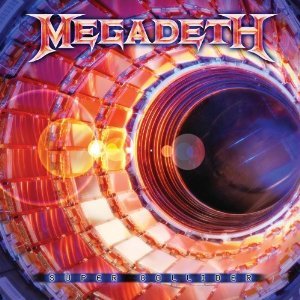
Megadeth, "Super Collider" (UMe)
If Dave Mustaine didn't have so many talents, his fans would criticize him less when he uses 'em. After the Megadeth singer-axman found out he could write great tunes like "Trust" (1997) and not just great riffs like "Wake Up Dead" (1986), it was the end of the world according to speed-metal absolutists.
The world has ended many times since then. And every time Mustaine showcases his skillz in melodic songcraft, old-liners spit out their meth-rotted teeth sputtering that he's making music to listen to with yer mom. News flash, dudes: Mustaine is 51. He has two nearly grown children. He IS yer mom.
So Mustaine has gathered enough trench experience to follow the opening charger "Kingmaker" and the monstrously hooky title anthem with Spanish tinges ("Off the Edge," "Beginning of Sorrow"), Hendrix blues ("Don't Turn Your Back on a Friend"), and yeah, a banjo-fiddle back-porch introduction ("The Blackest Crow"); closing the record with "Cold Sweat," a little-known Thin Lizzy bull roar from 1983, was a smart touch. And he pulls it all off! On "Forget To Remember," Mustaine even approaches the subject of elder dementia with complex poignancy -- a beautiful rocker, one of his best.
Not every lyric rises to that level, and I'm not totally sold on guitar foil Chris Broderick, who contributes more speedy technique than emotion. But "Super Collider" delivers the goods again and again and again. If I could listen to it with my mom, I would.
"Louder Than Hell: The Definitive Oral History of Metal" by Jon Wiederhorn & Katherine Turman (ItBooks)
Musicians, damn 'em, often tell their stories better than I do, so it's great to see metal stars blabbing their own myths. Sabbath, Zep, Kiss, Priest, Crue, WASP, GNR, Metallica, Slayer, all the way through to the grinders, deathsters and blacksters of recent years -- most every major player gets his/her licks in. Which drugs? How much sex? What stupid pranks? You find out, 700 pages worth. I stopped using it as bedtime literature, because it kept me awake. A fun way to slurp history.

